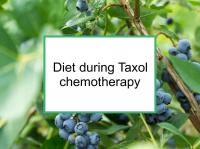Breast cancer stem cells have the ability to divide indefinitely. Regular cancer cells are the progeny of such stem cells. Limiting the number of breast cancer stem cells could limit the number of cells that can form tumors. Unfortunately, breast cancer stem cells are more resistant to breast cancer treatment than regular breast cancer cells.
Breast cancer stem cells can exist in a quiescent state, thereby avoiding being eliminated by chemotherapy or radiation treatment. This contrasts with regular breast cancer cells which typically remain in an actively dividing state, which exposes them to the cytotoxic effects of such treatments.
Now a new study has reported that 6-gingerol and 6-shogaol (both found in ginger) and pterostilbene (found in blueberries and grapes (especially black or red)) selectively induce the death of ER+/PR+ breast cancer stem cells. In addition, 6-shogaol and pterostilbene significantly increase the cytotoxic effects of paclitaxel.
Chemotherapy and stem cells
Chemotherapy can result in a higher proportion of breast cancer stem cells in the remaining cancer cell population, assuming a pathological complete response is not achieved. This is because normal breast cancer cells are more likely to die as a result of treatment, as noted above. Not only this, but there is some evidence that chemotherapy can reprogram regular breast cancer cells into stem cell-like breast cancer cells with stem cell-related genes. Stem cells are also more likely to become drug-resistant. In other words, after chemotherapy, the remaining breast cancer cell population can be more able to form tumors and metastasize, as well as being more treatment resistant.
Latest study identifies compounds that act against BC stem cells
The study referenced at the beginning of this news story was designed to examine that cytotoxic effects of five phytochemicals (6-gingerol, 6-shogaol, 5-hydroxy-3,6,7,8,3‘,4‘-hexamethoxyflavone, nobiletin, and pterostilbene) on hormone receptor positive (ER+/PR+) MCF-7 breast cancer cells and breast cancer stem cells. The authors found that 6-gingerol, 6-shogaol, and pterostilbene selectively killed breast cancer stem cells. In particular, these three photochemicals had high sensitivity for cells isolated from the MCF-7 population that expressed the surface antigen CD44+/CD24-, a stem cell marker. 6-shogaol and pterostilbene were shown to induce membrane injury and bleb formation (a bulge caused by a weak spot through which cytoplasm can flow), both signs of cell necrosis, in breast cancer stem cells, as well as inhibiting the mammosphere formation typical of such cells.
The authors also tested the impact of the phytochemicals on the sensitivity of isolated breast cancer stem cells to chemotherapy drugs. Both 6-shogaol and pterostilbene increased the sensitivity of the cells to chemotherapy drugs. In particular, 6-shogaol and pterostilbene significantly increased the cytotoxic effects of paclitaxel. The authors determined that 6-shogaol and pterostilbene reduced the expression of the surface antigen CD44 on breast cancer stem cells and inhibited signaling associated with breast cancer stem cell stemness.
Please see our article on how to optimize your breast cancer diet for information on what to eat during all stages of treatment and recovery.
